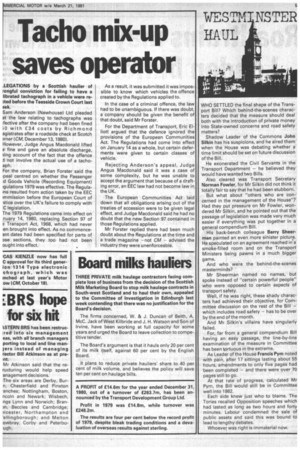WES TM NSTER HAUL
Page 7

If you've noticed an error in this article please click here to report it so we can fix it.
WHO SETTLED the final shape of the Transport Bill? Which behind-the-scenes charac ters decided that the measure should deal both with the introduction of private money into State-owned concerns and road safety matters?
Shadow Leader of the Commons Jahn Silkin has his suspicions, and he aired them when the House was debating whether a time limit should be set on future discussion of the Bill.
He exonerated the Civil Servants in the Transport Department — he believed they would have wanted two Bills.
Also cleared was Transport Secretary Norman Fowler, for Mr Silkin did not think it totally fair to say that he had been stubborn.
But what about "others who are concerned in the management of the House"? Had they put pressure on Mr Fowler, won dered Mr Silkin, and he pointed out that the passage of legislation was made very much easier if everything was put together in a general compendium Bill. His back-bench colleague Barry Sheerman painted an even more sinister picture. He speculated on an agreement reached in a smoke-filled room and on the Transport Ministers being pawns in a much bigger game.
And who were the behind-the-scenes masterminds?
Mr Sheerman named no names, but spoke instead of "certain powerful people" who were opposed to certain aspects of transport safety.
Well, if he was right, theseshady characters had achieved their objective, for Committee discussion on the rest of the Bill — which includes road safety — has to be over by the end of the month.
And Mr Silkin's villains have singularly failed.
For, far from a general compendium Bill having an easy passage, the line-by-line examination of the measure in Committee has been tortuous in the extreme.
As Leader of the House Francis Pym noted with pain, after 17 sittings lasting about 55 hours, amendments to only five pages had been completed — and there were over 70 pages still to go.
At that rate of progress, calculated Mr Pym, the Bill would still be in Committee well into 1982.
Each side knew just who to blame. The Tories recalled Opposition speeches which had lasted as long as two hours and forty minutes. Labour condemned the sale of public assets and said this was bound to lead to lengthy debates.
Whoever was right is immaterial now.












































































































